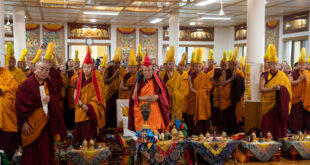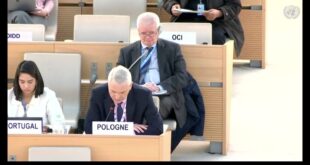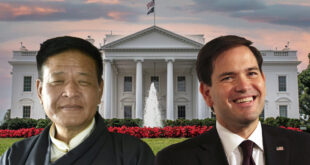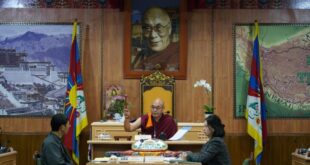Kirti Rinpoche participated in a panel discussion with Prof. Robert Thurman to discuss the topic, “Breaking Point: Understanding the Tibetan Self-Immolations” at the Roosevelt House in Hunter College, hosted by the Students for a Free Tibet on 22 November 2011. It was the last of Kirti Rinpoche’s series of speaking engagements in New York on the current situation in Tibet coordinated by the Office of Tibet.
Having the program at the Roosevelt House has a special significance as President Roosevelt himself stood for four freedoms—freedom of worship, freedom of speech and expression, freedom from want and freedom from fear.
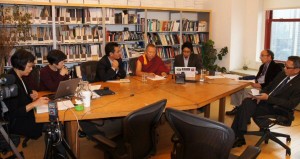
The previous afternoon, Rinpoche participated in another panel discussion “The Past in the Present: What is the Role of Local History in Events in Tibet Today?” at the Columbia University organized by the Modern Tibetan Studies Program at Columbia University. The distinguished panel included Jianglin Li, Independent researcher on Tibetan history in the 1950s and author of Yijiuwujiu Lasa! (Lhasa 1959!); Professor Tom Grunfeld, Historian of U.S. policy on Tibet and SUNY Distinguished Teaching Professor at Empire State College; and Benno Weiner, a Columbia PhD candidate (researching the history of Tibetan areas of Qinghai in the 1950s). Around 50 people, mainly students and faculty members attended the panel discussion.
The two most frequently raised questions at these forums and discussions were : 1) It has been over 60 years since China invaded Tibet, why for the first time we are noticing this new trend of Tibetans engaging in self-immolations in Tibet, and 2) Why are these self-immolation incidents concentrated in Ngaba area?
In answer to the first question, Rinpoche said in order to properly answer this particular question, one has to first analyze what benefits Tibetans have gained during this period. From 1959 to 1985, he said, most of the Tibetans were driven into communes and forced to do hard labors. Many Tibetans met untimely deaths due to hard labor, starvation, suicide, torture etc. From this, he said, it is apparent that Tibetans gained nothing apart from untold sufferings. And although it is true that the Chinese government brought economic development, mainly infrastructure development, inside Tibet since 1985 but again, the question is who actually benefited from this development? Newly developed transport facilities, he said, assisted the Chinese government to extract resources from Tibet and facilitated in bringing in more Chinese immigrants into Tibet; newly constructed high raise buildings accommodated the government and military officials as well as elite community. Tibetans, on the other hand, were forced to endure growing restrictions to their freedom of religious practice, freedom of movement, freedom of expression, freedom to be taught in their native language, and freedom to lead their traditional way of life. Thus, these drastic actions were actually the culmination of years of suffering and repression without any source nor any outlet for expressing and addressing the Chinese government’s repressive policy.
Answering the second question, Rinpoche said, since Ngaba is on the frontline, Tibetans there had suffered for three generations: First during 1936-37 when the red armies of CPC undertook the Long March in Ngaba area they looted the monasteries and local grain-storages and compelled Tibetans of that generation to experience starvation for the first time in their memory; second, since 1959, his own generation had to undergo untold sufferings as a result of Chinese government’s repressive policy; and third since 2008, the younger generation who are brought up under the Red Flag have to undergo so much repression and suppression that teenagers who undertook self-immolation were forced to choose death over living under such a condition. Therefore, he said, it is apparent that it is an outburst of wound that has been inflicted for three generations. Rinpoche did emphasize that the teenagers who undertook self-immolation have offered their lives to draw attention to the plight of the Tibetans inside Tibet from both the authorities in Beijing as well as from international community.
During his stay in New York, Rinpoche also briefed leaders of other faiths inNew Yorkon the current situation in Tibet, particularly about the recent waves of self-immolations.
On November 17th, Rinpoche appeared at a Brown Bag Briefing hosted by the Interfaith Center of New York which was attended by the members of Church related NGOs. On November 21st evening, Rinpoche participated in the Faith Leaders’ Prayer for the Sacrificed Lives hosted at the Chapel of the Church Center for the United Nations. The Service was joined by the faith leaders of Jewish, Roman Catholic, Muslim, Hindu, and Buddhist as well as by the Representative of His Holiness the Dalai Lama, Mr. Lobsang Nyandak. The service was attended by over 70 people.
The Office of Tibet also organized two special receptions—one exclusively for Rinpoche to meet with Chinese scholars and independent writers based in New York and another with the leaders of the local Tibetan community of New York and New Jersey. In both receptions, Rinpoche briefed the guests about the current situation inside Tibet and particularly the situation in Ngaba area after the waves of self-immolations there. On November 20th, Rinpoche also gave a talk exclusively for the Tibetan community in New York on “Kirti: A Cry for Freedom” hosted by the Students for a Free Tibet. The talk was well attended by the Tibetans in the city who wanted to hear more in-depth information about the current situation in Ngaba and other Tibetan areas.
Apart from the briefings, panel discussions, and talks, Kirti Rinpoche also gave a series of interviews to international media based in New York, starting with Chinese and English NTD-TV and the Epoch Times. He also later gave an in-depth interview to Solana Pyne for Global Post and Pankaj Mishra for The New Yorker magazine. One of the highlight of the media interviews Rinpoche had in New Yorkwas his press conference through web-link with the foreign correspondents based in Beijing, Shanghai and Hong Kong hosted by the New York based Human Rights in China (HRIC) on November 16th. The press conference was widely covered next day by all the leading international media which include South China Morning Post, The Wall Street Journal, The New York Times, BBC, The Financial Times, The Guardian, The Toronto Star, and Chinese language Radio Free Asia. The HRIC is the most influential and well recognized monitoring and advocacy group on human rights situation inside China and this was the first time the HRIC organized such a unique press conference using web-link and targeting the media within China itself.
Rinpoche also had an opportunity to meet privately with an official from the Office of High Commssioner for Human Rights at the United Nations to brief on the self-immolations inside Tibet and the briefing was also attended by Mr. Lobsang Nyandak, Representative of His Holiness the Dalai Lama to the Americas. In addition, Rinpoche also forwarded a copy of his written testimony submitted earlier to the Tom Lantos Human Rights Commission of the US Congress when he testified there on November 3rd to all the Permanent Missions to the United Nations.
Kirti Rinpoche has been visiting the United Statesat the advice of the Kashag, primarily to brief the United States Congressional members and concerned offices of the US Administration on the current situation in Tibet and particularly about the waves of self-immolations that have occurred since March this year. Rinpoche had hectic programs in the Washington DC from November 2nd to 7th coordinated by the International Campaign for Tibet.

